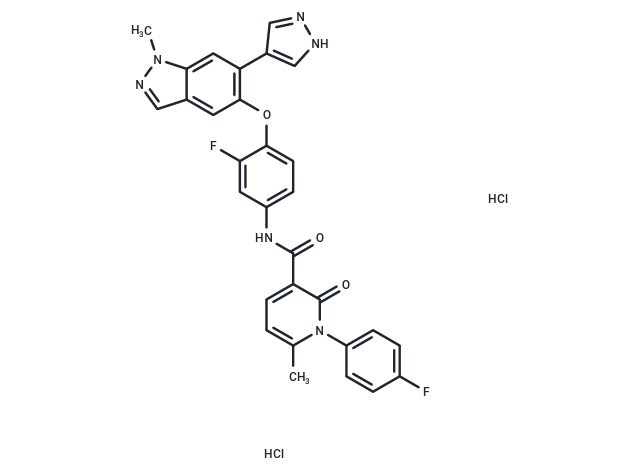Shopping Cart
- Remove All
 Your shopping cart is currently empty
Your shopping cart is currently empty

Merestinib dihydrochloride (LY2801653 dihydrochloride) is an orally available kinase inhibitor with antitumor activity that inhibits MET, AXL, RON, and MKNK1/2, and inhibits the growth of NTRK fusion-carrying tumors.

| Pack Size | Price | Availability | Quantity |
|---|---|---|---|
| 2 mg | $62 | In Stock | |
| 5 mg | $130 | In Stock |
| Description | Merestinib dihydrochloride (LY2801653 dihydrochloride) is an orally available kinase inhibitor with antitumor activity that inhibits MET, AXL, RON, and MKNK1/2, and inhibits the growth of NTRK fusion-carrying tumors. |
| Targets&IC50 | Axl:2 nM, MKNK1/2:7 nM, MST1R:11 nM, MerTK:10 nM, TEK:63 nM, FLT3:7 nM, c-Met:2 nM (Ki), DDR1/2:0.1-7 nM, S114 cells:59.2 nM, HGF-stimulated H460 cells:35.2 nM |
| In vitro | Merestinib dihydrochloride is a potent, orally bioavailable c-Met inhibitor with a Ki value of 2 nM and significant antitumor activity. In addition, Merestinib dihydrochloride showed significant antitumor activity against MST1R (IC50=11 nM), FLT3 (IC50=7 nM), AXL (IC50=2 nM), MERTK (IC50=10 nM), TEK (IC50=63 nM), ROS1, DDR1/2 (IC50=0.1/7 nM) and MKNK1/2 (IC50=7 nM) showed potent activity. Merestinib dihydrochloride affected MET pathway-dependent cell scattering and proliferation. In HGF-stimulated H460 cells, the mean IC50 value for Merestinib dihydrochloride on MET autophosphorylation was 35.2 nM, compared to 59.2 nM in S114 cells. Transfection of MET variants gave cells growth factor independence, and treatment with Merestinib dihydrochloride was able to inhibit the growth of these MET variant clones with IC50 values ranging from approximately 3-fold more potent (V1092I) to approximately 6-fold less potent (L1195V) compared to MET wild-type sequences. [1][2] |
| In vivo | Merestinib dihydrochloride showed significant antitumor effects in a MET-amplified xenograft model (MKN45), a MET autocrine model (U-87MG and KP4), and a MET overexpression model (H441), as well as in vivo vasculature normalization. As a type II ATP-competitive inhibitor, Merestinib dihydrochloride is a slow dissociating inhibitor of MET tyrosine kinase with a pharmacodynamic residence time (Koff) of 0.00132 min^-1 and a half-life (t1/2) of 525 min.Merestinib dihydrochloride treatment inhibited MET phosphorylation with a combined TED50 (50% targeted inhibitor dose) of 1.2 mg/kg and TED90 (90% targeted inhibitor dose) of 7.4 mg/kg.With Merestinib dihydrochloride (20 mg/kg), TFK-1 tumor growth was significantly lower than that of the control group. In addition, Merestinib dihydrochloride effectively inhibited the growth of intrahepatic and extrahepatic cholangiocarcinoma (CCC) xenograft tumors. [1][2] |
| Alias | LY2801653 dihydrochloride, LY 2801653 dihydrochloride |
| Molecular Weight | 625.45 |
| Formula | C30H24Cl2F2N6O3 |
| Cas No. | 1206801-37-7 |
| Smiles | Cc1ccc(C(=O)Nc2ccc(Oc3cc4cnn(C)c4cc3-c3cn[nH]c3)c(F)c2)c(=O)n1-c1ccc(F)cc1.Cl.Cl |
| Relative Density. | no data available |
| Storage | keep away from moisture,store at low temperature | Powder: -20°C for 3 years | In solvent: -80°C for 1 year | Shipping with blue ice. | |||||||||||||||||||||||||||||||||||
| Solubility Information | DMSO: 80 mg/mL (127.91 mM), Sonication is recommended. | |||||||||||||||||||||||||||||||||||
Solution Preparation Table | ||||||||||||||||||||||||||||||||||||
DMSO
| ||||||||||||||||||||||||||||||||||||

Copyright © 2015-2025 TargetMol Chemicals Inc. All Rights Reserved.